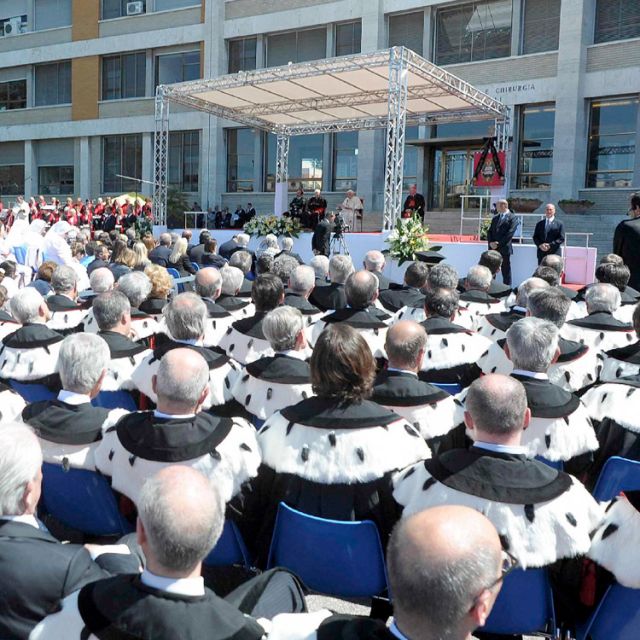The Pope made his remarks May 3 in an address to faculty, doctors and students at Rome's Sacred Heart University, one of the biggest Catholic universities in the world.
The Pope spoke to hundreds of people, including Italian government officials, gathered in the square outside the auditorium of the university's Agostino Gemelli Department of Medicine and Surgery. His visit marked the 50th anniversary of the faculty's founding.
The Pope praised the scientific and technological discoveries that have been made in modern times, saying they rightly are a source of pride. However, the "breakneck" speed of innovation sometimes has brought with it "disturbing consequences."
Lurking behind the optimism about all the new possibilities now open to humanity is "the shadow of a crisis of thought," he said.
Mankind has a plethora of new tools and means but often lacks noble ends because the prevailing culture of "reductionism and relativism" has led to the disappearance of the true meaning of things, he said.
"Almost blinded by technical potency, (humanity) forgets the fundamental question of meaning, thereby banishing the transcendental dimension to irrelevance," he said.
In this kind of environment, the Pope said, intellectual thought "becomes weak" and is based on impoverished ethical foundations, which "clouds valuable normative points of reference."
"A mentality that is basically techno-practical creates a risky imbalance between what is technically possible and what is morally good, with unforeseeable consequences," he said.
Therefore, it is critical that modern culture rediscover the meaning and role of the transcendent, he said.
Scientific inquiry and the search for meaning both share the same source -- the "logos" or creative rationality of God himself, Pope Benedict said.
In fact, the search for truth and for the absolute has been part of what fuels the desire to deepen scientific enquiry and all areas of human knowledge, he said.
The very same motivation behind scientific discovery "originates in the longing for God that dwells in the human heart: essentially scientists aim -- often unconsciously -- to obtain that truth that can give meaning to life."
Science and faith have a mutually enriching relationship, the Pope said, and reflect an "almost complementary requirement" for discerning reality.
"Yet paradoxically, a positivistic culture, which excludes the question of God from scientific debate, leads to the decline of thought and the weakening of the intellect's ability" to understand reality, he said.
Christianity doesn't drive faith into the realm of the irrational, rather it shines light on the dizzying maze of options and alternatives in the world, and guides people toward the right path of "the way, the truth and the light" in Jesus Christ.
When it is carried out correctly, "research is illuminated by science and faith and draws its impetus and enthusiasm from these two 'wings' without ever losing the accordant humility and sense of limits," he said.
Thus, "the search for God becomes fruitful for the intellect, a leaven of culture, a promoter of true humanism and a quest that doesn't stop at the surface," he said.
Sacred Heart's teaching hospital -- usually referred to as the Gemelli Hospital and known for treating Popes -- has always known that healing isn't a job, but a mission, the Pope said. Research, teaching and study come together so that the institution reaches its full innovative potential, he said.
"No progress, let alone in the cultural sphere, feeds on mere repetition, but requires an ever new beginning" that demands an "openness to comparison and dialogue, which broadens the intellect and gives witness to the rich, prolific nature of the heritage of the faith."
A strong, well-formed Christian identity will influence everything one does and can be expressed by top-notch professionalism, he said.
Catholic universities have a particular tie to the church and are called to be "exemplary institutions" that don't reduce their vision to what is the most pragmatic, productive or economically advantageous or necessary. Rather, they enlarge their horizons to use human wisdom to explore and develop the gifts of creation, he added.
Merging scientific research with unconditional service to life is what defines the university's department of medicine because faith is being used as an inner resource and guide that does not overpower or oppose professional research and avid learning, he said.
The Pope encouraged the university to continue its work protecting human dignity and protecting life at all its stages.
Love for the human person, especially the weak, helpless and suffering must be at the core of medicine and research because "without love, science, too, loses its nobility. Only love guarantees the humanity of research," he said.


